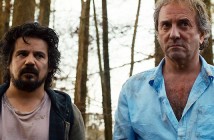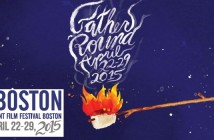Editor’s Notes: The following dispatch is part of our coverage of the Neuchâtel International Fantastic Film Festival. For more information visit nifff.ch and follow NIFFF on Twitter at @nifff.
At the Neuchâtel Fantastic Film Festival, it’s only ever a matter of time before one stumbles across a modest C-movie full of good intentions, but also desperately meager on good ideas. By and large, sticking to the International Competition and the safe Films of the Third Kind sections more or less ensures an untainted journey through the festival, but venture into the gory underbelly of the festival that is the Ultra Movies section and flop-likeliness skyrockets. Though much of its roster plays horror for the laughs, a perceived lack of seriousness can occasionally be a film’s saving grace. In the case of Jimmy Weber’s Eat, however, it’s not enough to distract from its amateurish look and feel, or the fact that its gory offerings are served in portions far too unsubstantial. Its story of an aspiring actress’ descent into self-cannibalism makes for a handful of effective sickening moments of extreme self-mutilation, sparsely distributed amidst what I’m only halfheartedly willing to call a plot. Add to that the actors’ flat deliveries, the prosaic writing and unashamedly unearned ending and you have all the reasons you need to wait for Weber to professionalize his approach.
Unquestionably some of the most fun you’ll likely have on film this year, What We Do in the Shadows’ bid for the best comedy of the year crown is hindered by the absence of anything resembling plot.
Much more rejoicing is Jemaine Clement (of Flight of the Conchords fame) and Taika Waititi’s What We Do in the Shadows, a consistently hilarious mockumentary on the lives of four vampires who share a flat in the Wellington area. The closest, and undoubtedly the most obvious, point of reference is TV’s The Office, not only because of its unintrusive but decidedly shaky camera handling, but also in the way it thrives on the awkwardness of its characters. Building from there, Clement and Waititi gleefully pick apart the enduring mythology of everyone’s favourite bloodsucking species. From their inability to look at themselves in mirrors while preparing themselves for a night out, to the logistic nuisance of cutting through a main artery while devouring a victim in a room filled with antiques, by way of the revolting aftermath of one vampire’s attempt to consume human food, no tradition is left unmocked. Considering the film’s joke-a-minute rhythm, it’s a genuine surprise that so few of these should fall flat, and indeed that they’re never anything other than smart. Unquestionably some of the most fun you’ll likely have on film this year, What We Do in the Shadows’ bid for the best comedy of the year crown is hindered by the absence of anything resembling plot. The final ten minutes’ bid to give the film a semblance of closure doesn’t dispel the fact that the first 75 minutes play like an offbeat reality TV show about chummy bat-people. Even so, it’s an eminently forgivable fault given just how exhilaratingly entertaining it manages to be. Considering the uproarious crowd response, you’d be hard pressed not to bet on it bagging an audience award.
In Evans’ previous film, the storyline inserts felt like lifeless, and exceedingly dull, distractions from the real fun, but those could ultimately be forgiven for how little of the running-time they occupied. The Raid 2: Berendal’s approach is the polar opposite…
My third day at the festival was frustratingly cut short after my painstaking attempts to remain awake during Gareth Evans’ The Raid 2: Berendal ultimately extinguished any enthusiasm for my planned final screening (Discopath). In times of dispiriting disappointment, such as this one, we would do well to remember Mies Van Der Rohe’s famous aphorism: « less is more ». 2011’s The Raid: Redemption’s kinetic dynamism, commitment to economic montage, and affecting hyperviolence made it not just one of my personal favourites of that year, but also an instant action classic for many aficionados. On the back of its wild success, Evans was suddenly flung into the spotlight and touted as a vital new directorial talent, a statement everybody seemed willing to make on the condition that we largely ignore the man’s inability to form any kind of coherent, or even remotely engaging, plot. Unfortunately, the financial boost received following The Raid: Redemption’s box-office success hasn’t brought upon us the all-round upgrade of our dreams, but a inhumanly powerful but frustratingly languid nightmare. In Evans’ previous film, the storyline inserts felt like lifeless, and exceedingly dull, distractions from the real fun, but those could ultimately be forgiven for how little of the running-time they occupied. The Raid 2: Berendal’s approach is the polar opposite: tedious Tarantino-lite dialogue makes up an enormous portion of the movie, with the always exhilarating fight scenes popping up only too sporadically. Whereas I might have been willing to overlook any self-indulgence had it been at the service of those scenes of magnetic combat in which the director’s talent is so glaringly pronounced, I cannot abide by its being extended to exactly that which should have been kept low-key. There is no quantifying my disappointment as I left the theater, my very soul battered not by the unsurprisingly excellent fighting on camera, but by the monolithic mundanity of the film interminable plot. Approach with caution, lower your expectations or just stick with the better example of Evans’ unmistakable skill.




